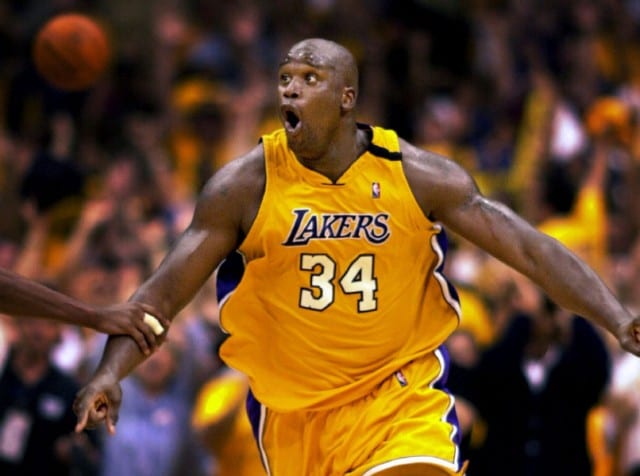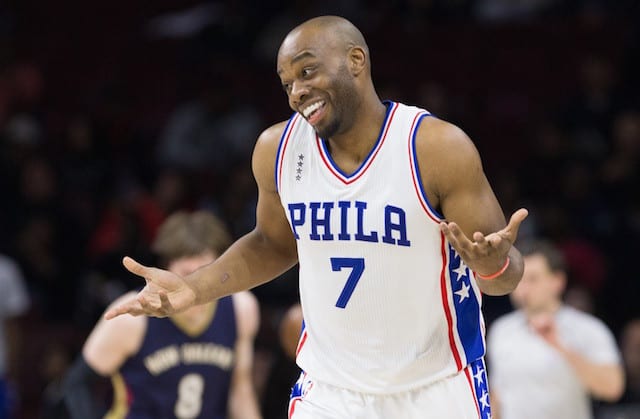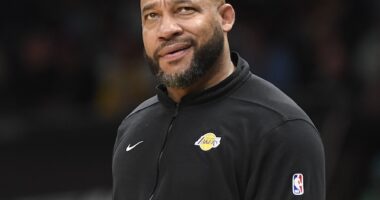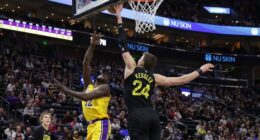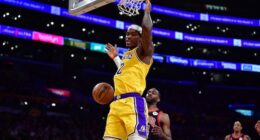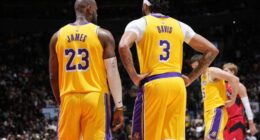After a truly remarkable career, Shaquille O’Neal is set to be inducted into the Naismith Memorial Basketball Hall of Fame next week.
Born in “Brick City,” New Jersey, O’Neal not only had a legendary career as an NBA player, but has — and continues — to live a legendary off-the-court life as well.
On the basketball side of things, at 7’1” and 300 pounds, a young Shaquille O’Neal established himself as an unstoppable force during his years at Louisiana State University for three seasons.
After averaging 21.6 points, 13.5 rebounds, and 4.6 blocks in college, The Big Fella — who would acquire numerous nicknames throughout his career — solidified his place as the first overall pick in the 1992 draft. The pick belonged to the Orlando Magic.
O’Neal was paired with Anfernee “Penny” Hardaway in Orlando, where the two certainly created some magic together — pun intended. The pair even made it to the 1995 NBA Finals, with Shaq averaging 28.0 points, 12.5 rebounds, 6.3 assists and 2.5 blocks during the series.
Despite this, Hakweem Olajuwon (32.8 points, 11.5 rebounds, 5.5 assists, 2.0 blocks and 2.0 steals) and the Houston Rockets swept the Magic in four games.
After Shaq’s rookie contract was up, he opted to sign with the Los Angeles Lakers in 1996, becoming one of the first superstars to change teams in free agency.
Most us know the history there: The three-peat along with three Finals MVPs, the feud with Kobe Bryant, and eventually, the departure.
It was certainly a special time for the Lakers, their fans, and the city of Los Angeles.
And it’s where Shaq left his most significant size 22 footprint.
We’ll get back to this in a minute, as the title of this article suggests.
Shaq was eventually traded to the Miami Heat in the summer of 2004, and won a fourth title alongside Dwyane Wade in 2006.
He would then drift around the league to the likes of the Phoenix Suns, Cleveland Cavaliers, and eventually the Boston Celtics, before finally calling it quits in 2011.
On the personal side of things, O’Neal has certainly lived his life to the fullest as well.
Despite leaving college after three seasons, he made a promise to his mother to finish his undergraduate degree. He did just that in 2000 after continuing his education while maintaining his dominance in the NBA.
He then earned an MBA from the University of Phoenix in 2005, as well as an Ed.D in Human Resource Development from Barry University in 2012.
Shaq had always shown an affinity for law enforcement as well and became a reserve officer in both Los Angeles and Miami during his respective stays in each city.
The Big Aristotle has enjoyed a very successful business career too, and currently, owns part of the Sacramento Kings.
And who can forget The Diesel’s rap career? Shaq released five rap albums, while collaborating with the likes of Michael Jackson, Notorious B.I.G., and Ice Cube.
But please, let’s forget Shaq’s movie career (Kazaam, anyone?) and move on.
His television career has been much better, thankfully. Following a few network shows, O’Neal now sits alongside Charles Barkley, Kenny Smith, and Ernie Johnson on TNT’s award-winning Inside The NBA.
Shaq’s Arrival To The Lakers
En route to becoming Dr. Shaq, O’Neal’s thesis was titled “The Duality of Humor and Aggression in Leadership Styles.”
It’s no secret this title was likely drawn from his leadership style throughout his career as a basketball player.
And the duality of Shaq’s personality was certainly what made his stay in Los Angeles larger than life.
An absolute beast on the court, Shaq would counter the aggressive nature of his play with his off-the-court demeanor as a fun-loving, entertaining personality.
Dr. Jerry Buss married the Lakers and Hollywood back in the 1980s to birth the Showtime era, and Shaquille O’Neal was the perfect leading man to star in the new Shaq-Kobe era.
Whereas Kobe Bryant was in attack mode 24/7, Shaq was the life of the party once the bright lights of the game shut off. On the court, their complementing styles led to much success.
It was truly a purple & golden era for Los Angeles, as The Diesel helped carry the Lakers back to the promise land for the first time since the 1980s.
As soon as O’Neal announced he was leaving Orlando and heading West in 1996, it was time for the Lakers to celebrate. Shaq arrived in classic fashion, giving fans a preview of the big personality he’d bring with him.
Paired with a young superstar-in-the-making in Kobe Bryant, along with Eddie Jones and Nick Van Exel, the championship expectations were high for the team that once ruled the ‘80s.
Not to mention Shaq was now part of a lineage of legendary Lakers centers.
From George Mikan to Wilt Chamberlain to Kareem Abdul-Jabbar, the pressure was on him to cement his own legacy with the storied franchise.
Despite an incredible amount of talent, the Lakers just couldn’t get over the hump and make it to the NBA Finals.
The Lakers would eventually trade Van Exel and Jones, leaving it up to the dynamic duo of Shaq and Kobe to bring a championship back to Los Angeles.
Insert former Chicago Bulls coach Phil Jackson in the summer of 1999, and the Lakers did just that.
The Three-Peat Years
With Jackson at the helm, the Lakers were firing on all cylinders, finishing 67-15 at the end of the 1999-2000 season.
One major highlight during the season was Shaq’s game versus the Los Angeles Clippers on March 6, 2000, which also happened to be his 28th birthday.
The back-story to the game was that Shaq had a number of friends and family in town to watch him play on his birthday.
However, it was a designated “home” game for the Clippers, and they denied his request for additional tickets.
He ended up having to pay for them himself.
The result? Shaq’s teammates fed him the ball all night and he ended up with 61 points and 23 rebounds on 68.6 percent shooting, while routing the Clippers, 123-103.
His post-game response? “Don’t ever make me pay for tickets.”
The Clippers may not have paid for Shaq’s tickets that night, but they certainly paid the price of ticking off the birthday boy.
Shaq had his best season to date that year, averaging 29.7 points, 13.6 rebounds, 3.8 assists, and 3.0 blocks per game — all en route to his first league MVP. He nearly won the award unanimously, except for one first place vote going elsewhere.
The dominance didn’t stop there as the Lakers battled through the playoffs, largely riding the coattails of the Big Fella’s 30.7 points and 15.4 rebound average.
The most iconic moment of the 2000 playoffs — and essentially the Shaq-Kobe era altogether — was the infamous lob from Bryant to O’Neal in Game 7 of the Western Conference Finals against the Portland Trailblazers.
It was the capstone to an incredible 15-point fourth-quarter comeback.
https://www.youtube.com/watch?v=NLOMEmRQ40U
That game — and that moment — propelled the Lakers to the Finals, and many believe it was the defining moment that sparked a dynasty.
The Lakers would go on to defeat the Indiana Pacers for their first title since the Showtime era, with Shaq again propelling his game to new heights. He averaged 38.0 points and 16.7 rebounds on 61% shooting, adding his first Finals MVP trophy to his regular season MVP.
The following season, the Lakers weren’t quite as dominant in the regular season as the team went 56-26.
However, the Lakers flipped the proverbial switch and steamrolled through the playoffs.
Kobe had emerged as a true superstar following the first championship, and was no longer considered a sidekick of Shaq.
Bryant’s numbers jumped from 21.1 points, 4.5 rebounds, and 4.4 assists in the 2000 playoffs to 29.4 points, 7.3 rebounds, and 6.1 assists in the 2001 post-season run.
Shaq was just as dominant as he was the previous year, with 30.4 points, 15.4 rebounds, 3.2 assists and 2.4 blocks in the post-season.
The two were a true dynamic duo at this point.
The result? The Lakers went 11-0 to advance to the 2001 NBA Finals, where they’d face the Philadelphia 76ers.
On that Sixers team would be none other than Allen Iverson, who happens to be entering the Hall of Fame alongside Shaq.
Remember that one MVP vote that went elsewhere in 2000? Well, that vote went to Iverson and he was now the league MVP and looking to take out the reigning NBA champs.
Iverson, generously listed at 6’0 and 165 pounds, may have been small but he led the league in scoring and was an extremely potent offensive threat.
The Finals were set to be explosive with three of the top four scorers in the league on the same floor, but fortunately for the Lakers, they happened to have two of them.
Despite a valiant effort from Iverson, who dropped 48 points (to Shaq’s 44) in Game 1 en route to a 107-101 victory for the Sixers, the Lakers knew they had to stay on Superman’s back in order to win another title.
And that’s exactly what they did.
In Game 2, the Sixers doubled-teamed Shaq throughout the game, but the Lakers continued to utilize him as the focal point of the offensive and defensive ends.
He put on one of the most dominant all-around performances in Finals history with 28 points, 20 rebounds, nine assists, and eight blocks to even up the series.
Let that sink in for a minute. That’s almost a quadruple-double in the Finals!
Iverson nearly averaged 36 points per game in the series, but Shaq’s dominance was just too much for the Sixers to handle as the Lakers never took another loss after Game 1.
The Lakers’ 15-1 record is still the best in NBA playoff history.
Shaq finished the Finals with a 33.0 point, 15.8 rebound, and 4.8 assist average — earning himself another Finals MVP trophy.
Now back-to-back champs, it was time to party!
No one quite knew how to get the party started better than The Diesel, with a little help from Mark Madsen, of course.
Always the entertainer, Shaq turned an event for fans to show their love and affection for the Lakers into a spectacle that had to be witnessed.
Not only did he entertain, but Shaq managed to declare the Lakers’ dominance and challenge his team to three-peat, which was a term Pat Riley coined in 1988 but could never deliver on.
The Lakers were on a mission to fulfill that challenge in 2002, but this time, it wouldn’t be such a cakewalk.
Matched against a deep Sacramento Kings team in the Western Conference Finals, the Lakers were tested as hard as they ever had been. Thanks to some late-game heroics from Robert Horry, the Lakers put themselves in position for a do-or-die Game 7 on the road with the Kings having one of the most raucous home crowds in the NBA.
It was a tough series, but O’Neal wouldn’t let the Lakers lack for confidence, as he trash talked and ridiculed the “Sacramento Queens” through the media — much to the delight of passionate Lakers fans
Shaq, Kobe, Horry, Rick Fox, Derek Fisher & Co. had to give it all they had to squeak out a victory, but they once again earned themselves a trip to the NBA Finals.
From there, it was back to the strategy that had worked so well for the Lakers in the finals: Get the ball to Shaq and let him dominate the smaller Eastern Conference team.
Wilt Chamberneezy delivered once again, averaging 36.4 points and 12.3 rebounds en route to sweeping the New Jersey Nets for another championship and third Finals MVP award.
There’s only one word to describe the kind of performances Shaq displayed in three consecutive NBA Finals: Dominant.
Unfortunately, the Lakers would not win another championship with Shaq, as a disappointing 2004 Finals loss to the Detroit Pistons would essentially end the already-infighting (players and management) Lakers’ chances of reconciliation.
Shaq was traded to the Miami Heat following the season.
Nonetheless, as much as people will talk about the fireworks between Shaq and Kobe and what could’ve been, the reality is the dynamic between the two alpha-males on the court was highly successful and entertaining, overall.
The Lasting Memories
Despite the heartbreaking departure, The Diesel left a lifetime of memories for Lakers fans during his eight seasons in Hollywood.
It was the ferocity in which he dominated his opponents, the entertainment he provided on and off the court, and the unwavering confidence he instilled in the team and really, the whole city of Los Angeles.
The league was dominated by guards and wing players during Shaq’s prime, from teammate Kobe Bryant to All-Stars Allen Iverson, Tracy McGrady, Vince Carter, Jerry Stackhouse and Paul Pierce.
Most of those guys were flashy and extremely popular, but Shaq managed to be just as popular as a center because of his dominance and the flair in which he played, along with his off-court charisma.
Guards could get hot and appear seemingly unstoppable as their jumpers swished and their drives looked devastating, but nothing quite compared to a monstrous slam dunk by Shaq over a seven-footer whom he made look like an ant.
The dunk, the flailing of the legs, and then the smooth push to the ground.
Oh, the disrespect, Big Fella!
There’s so many things Lakers fans will always remember Shaq for.
The signature drop-step; the staring at his left hand after an off-handed hook shot; and of course the missed free throws — except when they counted, as he would say.
Then the video clips and sound bytes to the media; the various entertainment appearances; and the celebrities he’d hang with.
The best moments may have been when he’d display his personality on the court for fans who could only sit back and laugh at what he was capable of at his size.
He was part of an era where guards dominated the sport, but don’t tell The Big Point Guard he couldn’t go coast-to-coast just as well as they could.
And of course, who remembers Shaq and Kobe’s pre-game ritual of battling one-on-one?
How about a few more dunks?
Then there’s the times the Man of Steel proved he was truly a man of the community, like when he wrote a check to the LAPD for a new squad car after he learned one was burned during the celebration of the 2000 championship.
The Duality Of Shaq
Perhaps Shaq would’ve won championships in Orlando if he stayed. Or maybe he would’ve won with another team of his choosing.
Regardless of what would or could have happened, it simply wouldn’t have been the same because Shaq was made for Hollywood and Hollywood was made for him.
He embraced the limelight from the start and made the city his.
Kobe was young at the time and solely focused on being the best player on the planet, unforgiving of how he’d be perceived by the media, his opponents, or even his teammates.
He’d essentially let his game speak for him, which certainly worked out well for him in the long run.
Shaq, on the other hand, was primed to take the city by storm from day one and make it fall in love with him as a larger-than-life basketball player and celebrity — the duality of a player that Lakers fans craved since the Showtime era.
It was a perfect fit.
You could argue that Shaq wasn’t just the biggest athlete (both literally and figuratively) in Los Angeles, but one of the brightest stars in Hollywood during his reign as well.
Because of that, and the excitement he brought to an entire city, his legacy will always be that of a Laker.
Only time will tell if he’ll ever get a star on the Hollywood Walk of Fame, but the basketball side of Shaquille O’Neal will deservedly enter the Hall of Fame next week.
He’s earned himself a new nickname now: The Big Hall-of-Famer.
